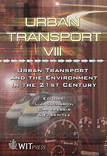Empirical Modelling Of Automobile Dependence In The Boston Area
Price
Free (open access)
Transaction
Volume
60
Pages
10
Published
2002
Size
595 kb
Paper DOI
10.2495/UT020391
Copyright
WIT Press
Author(s)
M. Zhang
Abstract
The public concern over automobile dependence is not the automobile itself, but the overuse of and dependence on it. Measuring automobile dependence properly is essential to better understanding the nature and causes of automobile dependence, and to identify and evaluate effective policy strategies to overcome automobile dependence. This paper complements existing studies by analyzing automobile dependence from the perspective of individuals’ travel choices. Applying logit captivity modeling, the study quantifies the degree of automobile dependence as the likelihood of an individual becoming captive to driving. The study shows that in the Boston area there are 16% and 86% chances that the urban and suburban travelers, respectively, are captive to the automobile. The estimated automobile dependence indices for the non-work trips are generally greater than for the work trips. Surprisingly, the lower income drivers have a stronger tendency to be dependent on the automobile than the higher income. The study suggests that policy making should be aimed to increase viable travel choices. Achieving the goal requires a combination of complementary strategies including land use planning and design, alternative transportation supply and automobile pricing.
Keywords





